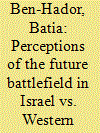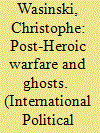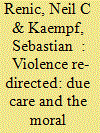| Srl | Item |
| 1 |
ID:
160947


|
|
|
|
|
| Summary/Abstract |
In the post-heroic era, features of warfare have dramatically changed in Western armies, but what about the future? This study focuses on the perceptions of commanders and experts from Israel versus those of commanders and experts from three Western countries (UK, Sweden and the US) regarding the challenges those armies will face in the future battlefield, at both the macro and micro level. This examination can lay a foundation for understanding the differences in the perceptions of the challenges that Israel and other countries are facing and to identify the major issues that must be considered in the discussion about the future battlefield. Most of the respondents found it difficult to anticipate the future. However, the Israeli narrative of the future was different from the narratives in the other countries. Qualitative analysis has exposed four factors of future battlefield perceptions: the characteristics of conflicts, macro-social factors, information and technology, and unit and command. In the Israeli context, complexity was perceived as a difficulty and even as a threat.
|
|
|
|
|
|
|
|
|
|
|
|
|
|
|
|
| 2 |
ID:
082633


|
|
|
|
|
| Publication |
2008.
|
| Summary/Abstract |
According to some researchers, the public acceptance of military intervention is conditional upon the minimization of military mortality. Once a threshold of military death is crossed, political leaders are obliged to limit their ambitions. This research proposes to consider the idea of threshold as mythical. Instead, it suggests focusing at the presence of the ghosts the dead American soldiers in the public sphere and the way they are ``ventriloquated'' in order to support or contest the intervention
|
|
|
|
|
|
|
|
|
|
|
|
|
|
|
|
| 3 |
ID:
191956


|
|
|
|
|
| Summary/Abstract |
In this article, we argue in favour of a conceptual expansion of the Just War idea of ‘due care’, to include the foreseeable, but indirect harm generated by Western force protection. This harm includes the phenomenon of ‘casualty displacement warfare’ – circumstances in which the prioritisation and relative success of Western force protection incentivises some Western adversaries to redirect more of their own violence away from Western soldiers and onto civilians. Primary moral responsibility for such violence should be allocated to those who violate the principle of non-combatant immunity, whatever their motivations. Critically though, we argue that Western militaries do bear some indirect culpability for the conflict conditions that structure such violence. These same militaries, we argue, are morally duty bound to do what they feasibly can to reduce the risks of casualty displacement, even if this necessitates a relaxation of their own commitment to force protection.
|
|
|
|
|
|
|
|
|
|
|
|
|
|
|
|